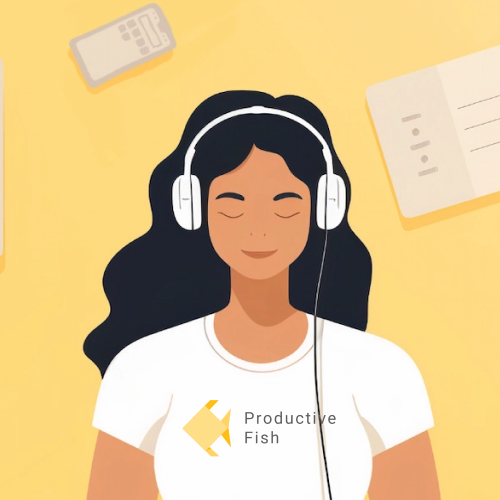How to Improve your Focus and Concentration
 Maria (from Productive Fish)
Maria (from Productive Fish)
From the moment we wake up to the moment we go to bed, we check our phones every 12 minutes on average. And with the rise of social media and digital activities, the collective attention span these days is 8 seconds. Indeed, as we consistently switch between topics, and consume a large volume of unrelated pieces of information for fear of missing out on something (FOMO), we train our minds to concentrate in short bursts and exhaust our attention.
And studies are clear; these ever-increasing interruptions and distractions are negatively affecting our focus and concentration skills. This can lead to procrastination and make it more difficult to be productive and reach your goals.
Fortunately, it’s not all gloom and doom ;)
What Is Focus Exactly
In essence, the term focus refers to your ability to concentrate and pay attention to a specific task or activity without being distracted. As a result, it implies being able to ignore or say no to other tasks, activities, or interruptions. After all, only if you’re able to tune out and get into your zone, solely concentrating on the task or activity at hand, will you be able to efficiently accomplish this task. And Tim Ferris summarized this idea perfectly when he said “What you don’t do determines what you can do.”
How does Focus Work
Well, as you’re reading this article, your brain focuses using three types of attention to enable you to concentrate and process the information:
Selective Attention
Selective attention allows you to focus on one single task and ignore other things. It is used in the midst of other activities. For instance, you could be having a conversation with a friend in a loud bar.
Divided Attention
This refers to your ability to process multiple pieces of information at the same time and carry out several tasks at once. For instance, singing a song while driving your car or talking on the phone while cleaning your home requires divided attention.
Sustained Attention
Sustained attention is the ability to maintain your focus on a specific task or activity over a long period of time. For instance, if you’re reading a book for a couple of hours, or are working on a challenging project for a few hours in a row, your brain will be using sustained attention to complete these tasks.
How to Improve Focus and Concentration
If you’re struggling to concentrate on things that you want to complete, here are a few strategies you can use to strengthen your attention and improve your focus:
Adopt Monotasking
We’ve covered earlier that doing several things at the same time is an ineffective way. The opposite of multitasking is monotasking, giving your full attention to one activity. It’s like telling your brain, "Let's do one thing and do it really well!" So if you work or learn – avoid dividing your attention, and focus better on your task.
Limit Distractions
Limiting distractions and interruptions is critical to allow your brain to concentrate, and focus on your current task, or activity. Some of the things you can do to ensure you’re in a distraction-free working environment encompass:
Switch off your electronic devices including your phone and your TV
Block websites and apps that distract you
Turn off your emails and internal chat notifications
Closing your door to ensure people understand you’re busy
Using noise-canceling headphones.
Find Your Brain Music
The term might be intimidating but music helps you focus. Brain music simply refers to the different types of music that have been shown to help strengthen cognitive skills such as focus and concentration. According to research, playing symphonies or nature sounds triggers the areas of the brain that are involved with paying attention. What’s more, music can have a therapeutic effect, and help you relax, alleviating stress and leading to better concentration.
Practice Mindfulness
In essence, mindfulness trains your brain to relax, focus on the present, and concentrate on what is happening around you, or on the feelings inside your body right now. Therefore, using grounding exercises such as breathing, or noticing your moves is a fantastic way to improve your concentration and focus. Studies have even shown that 10 minutes of mindful meditation a day can significantly help strengthen cognitive skills such as concentration and focus.
Get Enough Sleep
Aim at sleeping between 7 and 8 hours a night. Professor of Medicine at Harvard Medical School emphasizes that during sleep, your brain consolidates memories and clears out toxins, preparing you for a new day of focused activity. So we recommend you adopt a few natural ways to sleep better:
Go to bed and wake up at the same time every day
Make sure your bedroom is a restful environment
Limit exposure to screens before bed
Establish a pre-sleep routine
Avoid heavy meals before bedtime.
Eat a Nutrient-Rich Diet
This can improve your mental alertness and your ability to concentrate. Some of the best scientifically-backed ’brain foods’’ include dark chocolate, nuts, seeds, berries, avocados, and oily fish. Make sure you feel light at least 2 hours before bed.
Some coffee may increase the blood flow if you drink it in the morning. However, avoid caffeine 5-6 hours before bed, be aware that it depends on each individual.
Exercise Regularly
Did you know that when you exercise your brain releases a chemical that encourages new brain connections? Exercising on a regular basis can also help increase your focus and concentration so make sure to incorporate some aerobic activities into your daily routine. And if you’re not a gym-goer, no problem. You don’t have to hit the gym. Walking your dog, cycling to work, or playing team sports all count towards getting your brain cells fired up.
Subscribe to my newsletter
Read articles from Maria (from Productive Fish) directly inside your inbox. Subscribe to the newsletter, and don't miss out.
Written by

Maria (from Productive Fish)
Maria (from Productive Fish)
Curious individual with a passion for marketing. Keen on productivity and work-life balance.